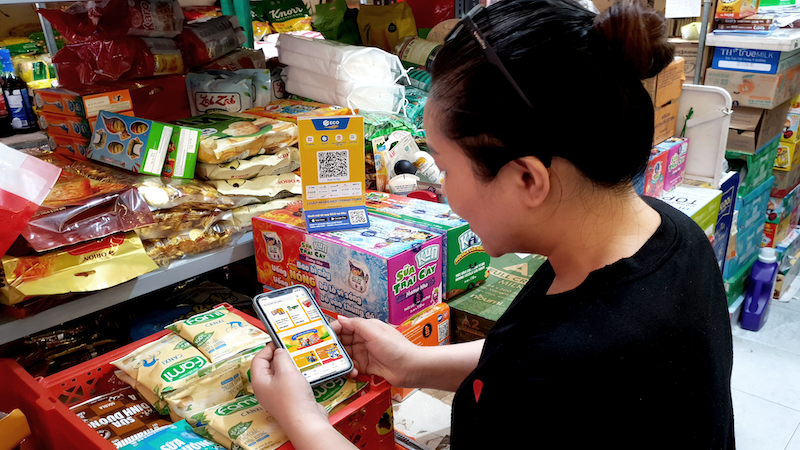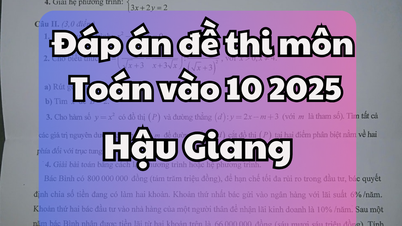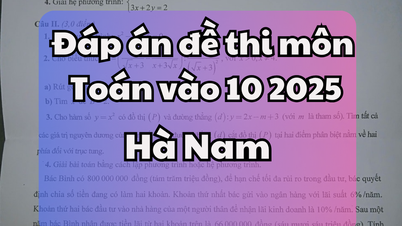Regardless of whether the transfer content mentions a purchase or not, if it is income arising from business activities, it must be declared and taxed. (Photo: MP)
“Tax evasion” due to misunderstanding of policy…
In recent days, on the streets, in restaurants or online markets, many consumers have been startled by the announcement: "Cash only, no transfers".
In Hanoi , Ms. Hong Anh in My Dinh (Nam Tu Liem, Hanoi) said that the owner of a restaurant near her house flatly refused to transfer money for the simple reason: "From now on, the restaurant prefers cash!"
Similarly, the story of Ms. Thanh Hang in Tay Son (Dong Da, Hanoi) after a trip to Vinh city is a noteworthy example. Visiting the famous “Banh mi Ba Tai” shop on Quang Trung street (Vinh city, Nghe An province), she was also asked to pay entirely in cash. “I was surprised and confused. While society is promoting cashless payments, there is a shop owner who goes against the trend like that,” Ms. Hang shared.
According to actual records, this is the reaction of many business households when the new tax policy comes into effect. Many business owners are concerned that if customers pay by bank transfer, the transactions will be "scrutinized" and revenue will be more easily controlled by tax authorities.
But according to experts, this is a serious misconception!
Sharing his opinion with reporters about this unusual reaction, Mr. Nguyen Van Duoc, General Director of Trong Tin Tax Consulting Services Co., Ltd., said that the seller's sudden refusal to accept the transfer creates inconvenience and negative psychology for the buyer, and they also limit their business opportunities in the current difficult economic context. In addition, refusing to accept the transfer payment is an act that shows signs of violating the law and needs to be considered.
However, not all businesses have the same understanding of this new tax calculation and tax application method. Ms. Nguyen Thi Hanh, owner of a grocery store in Ba Dinh District (Hanoi), shared: “My store still accepts bank transfer payments as usual. Because when I import goods, I have a clear input invoice, so whether customers pay by bank transfer or cash does not affect my tax declaration.”
Facing the risk of criminal prosecution
In fact, from a legal perspective, refusing to transfer money not only causes inconvenience to customers but also shows signs of violating the law. Even if the owner is found to charge two prices - one for the person paying in cash, one for the person transferring money, it is an act of fraud, intentionally concealing revenue, and can be severely punished.
“The government does not care how businesses collect money. It only cares about whether they enter invoices, declare and pay taxes properly,” Mr. Nguyen Van Duoc emphasized.
Not only in physical stores, the “tax avoidance campaign” is also spreading rapidly on online markets. Many sales accounts have announced to stop COD – a form that has been popular for many years in the online business world.
A shop owner announced to stop accepting COD.
An online shop owner wrote: “The tax situation is very strict, so all orders on our side are only accepted via bank transfer - COD is no longer accepted”. Some others even gave instructions: “Transfer money but write ambiguous content, so that the order value is 0 VND”. This is a trick to mislead the tax authorities - again, fundamentally wrong.
According to economist Nguyen Tri Hieu, a financial expert, all revenue generated from business activities, regardless of cash or transfer, regardless of the content, is subject to tax. Splitting revenue into multiple accounts, recording false content, or hiding revenue by stopping COD... is just a temporary evasion, very easy to detect.
“The tax authorities now have full tools, data and expertise to compare bank transactions and verify income. If taxpayers cannot prove the origin, they will be suspected of tax evasion and may be prosecuted,” Mr. Hieu warned.
Digital transformation - No room for fraud
According to statistics, there are currently about 3.6 million business households nationwide. Of these, nearly 2 million households apply lump-sum tax with an average rate of about 700,000 VND/month, contributing 25,953 billion VND to the budget. However, the lump-sum tax form - which is based on a provisional lump-sum rate - has exposed many loopholes, becoming fertile ground for tax evasion.
Decree 70/2025/ND-CP was issued as a major turning point: business households with revenue of over 1 billion VND/year, in the direct consumption sector such as restaurants, hotels, retail, transportation... are required to use electronic invoices from cash registers connected to tax authorities. At that time, revenue is recorded for each transaction, closer to reality - more transparent, less likely to be fraudulent.
Notably, from July 1, 2025, individuals and business households will also use personal identification codes instead of tax codes. Tax data has been linked to bank accounts, eTax Mobile app, VNeID, helping management agencies easily identify the entire cash flow and tax obligations of each individual.
"Regardless of whether the transfer content mentions purchasing goods or not, if it is income arising from business activities, it must be declared and taxed," a representative of the General Department of Taxation affirmed.
Some people still believe that “if it is not checked, it will not be processed”. But in reality, when it is determined that there is intentional concealment of revenue, the authorities can completely collect, impose fines and prosecute criminally, because this is no longer a “negligent” error.
Many people mistakenly believe that as long as they do not register their business or declare taxes, they will not be controlled. However, with increasingly transparent identification data and electronic transactions, all actual business activities can be detected, including “underground” activities on social networks.
Business people should give up tax "avoidance".
“Business people should abandon the mindset of “avoiding” taxes, instead proactively declaring fully and taking responsibility for real income. If you do it right, you only have to pay taxes and late payment interest (if any). If you deliberately evade, the consequences will be very serious,” Mr. Nguyen Tri Hieu emphasized.
Although switching to e-invoices is an irreversible trend, according to Mr. Mai Son, Deputy Director of the Tax Department (Ministry of Finance), the conversion process needs a reasonable roadmap and synchronous support, especially for small businesses and those who are not familiar with using technology. "To make a real conversion, it is necessary to review comprehensive policies from tax rates, operating costs to business support tools. Avoid causing 'shock' to people when switching from manual to digital", Mr. Son emphasized.
According to many tax policy development and implementation consultants, adjusting the previous lump-sum tax rate is necessary because that model does not allow for expense deductions, putting business households at a disadvantage compared to enterprises. Now, when switching to the form of declaration based on actual revenue, if transparent and cooperative, business households will have the opportunity to deduct input costs, reduce the amount of tax payable, and gradually qualify to move up to the enterprise model.
Instead of telling each other “tax evasion tricks”, experts recommend that what is necessary now is to proactively adapt to the new mechanism, understand the policy correctly and fulfill tax obligations honestly. When tax evasion is discovered, it is no longer an administrative error, but can be a criminal violation, then every decision to “avoid” today can have to pay a heavy price tomorrow. The reality of digital transformation operations in the tax sector proves that “when technology develops, there will be no way for fraud!”.
Source: https://baotuyenquang.com.vn/tu-choi-chuyen-khoan-ne-hoa-don-ho-kinh-doanh-dang-tu-lam-kho-minh-213052.html































































































![[OCOP REVIEW] Tu Duyen Syrup - The essence of herbs from the mountains and forests of Nhu Thanh](https://vphoto.vietnam.vn/thumb/402x226/vietnam/resource/IMAGE/2025/6/5/58ca32fce4ec44039e444fbfae7e75ec)






Comment (0)